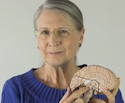
Love can be mysterious, thrilling, confusing, and even painful; but research suggests that your brain lights up the same way as if you were high on cocaine.
If you've ever experienced being in love, you know it's full of emotional roller coaster highs and lows.
In fact, a neuroscience professor associated with Albert Einstein College of Medicine, Lucy Brown, PhD, has conducted a study on MRI scans of individuals who are in the beginning phase of being in love. Dr. Brown found that these individuals' ventral tegmental area (VTA) of their brain (the same part of the brain that is active during a cocaine or other drug high) becomes active.
Does being in love affect any other part of your body and brain?
Dr. Brown discusses what happens to your body and brain when you're in love.
 Lucy L. Brown, PhD, is a neuroscientist and Clinical Professor in Neurology at Einstein College of Medicine in New York. She received her PhD in Experimental/Physiological Psychology from NYU in 1973. During a post-doctoral fellowship at Einstein, she worked on visualizing dopamine neurons and testing their plasticity in reward systems.
Lucy L. Brown, PhD, is a neuroscientist and Clinical Professor in Neurology at Einstein College of Medicine in New York. She received her PhD in Experimental/Physiological Psychology from NYU in 1973. During a post-doctoral fellowship at Einstein, she worked on visualizing dopamine neurons and testing their plasticity in reward systems.